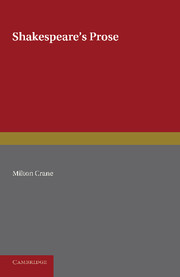V - Shakespeare: The Tragedies
Published online by Cambridge University Press: 05 June 2016
Summary
Comedy finds in prose a highly appropriate medium; tragedy and chronicle history, on the other hand, seem to exhibit no obvious need for prose, and the three plays by Shakespeare in which no prose appears are all chronicle histories on tragic themes: King John, 3 Henry VI, and Richard II. But the fact is that prose is quite as essential to Shakespearean tragedy as to Shakespearean comedy; basically dramatic function of prose in Shakespeare's the work shows itself even more clearly in the non-comic plays than in the comedies. In comedy, the contrasting elements are likely to be widely separated within the play. As many characters, rather than few, tend to speak prose, the use of prose for delineation of character or for dramatic contrast becomes more subtle, because the oppositions of form are less violent. Levels of comedy may be opposed, comic action differentiated from romantic intrigue or melodrama, and satirical commentators set apart from their prey. But as even the most violent passions are, in comedy, eventually frustrated or resolved, they become, as it were, potentially susceptible of being treated in prose.
It is never so with tragedy. The opposing quantities remain constant. When they seem to approach each other, it is only in order that the contrast may ultimately be heightened.
It has been suggested by Mr. C. L. Barber that prose in Shakespeare's tragedies is an extended use of comic prose analogous to the use of prose in the comedies themselves. Granted that striking parallels can be traced between Lear's mad prose and typical clown-prose, the vital question of purpose remains: does Lear speak down-prose for the reasons of a Launce or of a Falstaff? The element of comic relaxation is certainly not present in Lear's prose; the kind of contrast afforded by Launce is totally unlike the verse-prose opposition in the speech of Lear, whose verse helps to depict a choleric old man, but whose prose portrays a disintegrating mind. In King Lear, III, vi, the context of the Fool's lines robs them of any possible comic effect; Lear seizes on the Fool's question and relates it to his own situation. A little later in the same scene, the distinction between prose and verse breaks down almost entirely; the result is harmony, not contrast. The comic element of the Fool's prose is assimilated to the overwhelmingly tragic intent of the scene.
- Type
- Chapter
- Information
- Shakespeare's Prose , pp. 128 - 187Publisher: Cambridge University PressPrint publication year: 2013

